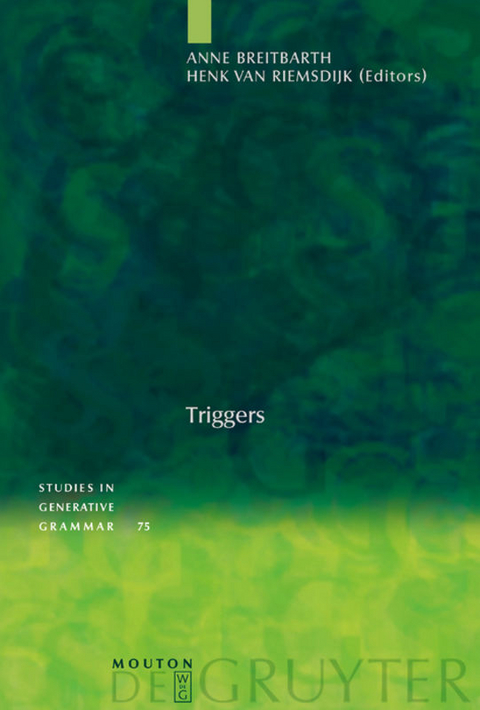
Triggers
Seiten
2004
de Gruyter Mouton (Verlag)
978-3-11-018139-5 (ISBN)
de Gruyter Mouton (Verlag)
978-3-11-018139-5 (ISBN)
The architecture of the human language faculty has been one of the main foci of the linguistic research of the last half century. This branch of linguistics, broadly known as Generative Grammar, is concerned with the formulation of explanatory formal accounts of linguistic phenomena with the ulterior goal of gaining insight into the properties of the 'language organ'. The series comprises high quality monographs and collected volumes that address such issues. The topics in this series range from phonology to semantics, from syntax to information structure, from mathematical linguistics to studies of the lexicon.
The concept of 'trigger' is a core concept of Chomsky's Minimalist Program. The idea that certain types of movement are triggered by some property of the target position is at least as old as the notion that the movement of noun phrases to the subject position is triggered by their need to receive nominative case. In more recent versions of syntactic theory, triggering mechanisms are thought to regulate all of movement. Furthermore, a quite narrow range of triggering mechanisms is permitted. As is to be expected, such a restrictive approach meets a variety of difficulties. Specifically, the question is whether all triggering elements required to cover displacement of all kinds in natural language can be independently motivated. Further, how can a trigger theory, which crucially relies on the idea that all movement is obligatory, deal with apparently optional movement processes? Are features an adequate means to express the triggering function in all cases? More radically, are all movement phenomena really the result of the checking of trigger features? And what about apparent triggering factors that are 'external' to syntax such as prosody - can they be captured in a rigid trigger theory? In other words, could certain aspects of triggered movement be due to interface conditions? Such is the range of questions addressed by the fourteen contributions to this book. They cover a considerable range of languages (including Afrikaans, Breton, Bulgarian, Dutch, English, French, German, Gungbe, Hungarian, Italian, Japanese, Kiswahili, Romanian). These papers present materials, both empirical and theoretical, that will not fail to have considerable impact on the further development of the concept of trigger in syntactic theory.
The concept of 'trigger' is a core concept of Chomsky's Minimalist Program. The idea that certain types of movement are triggered by some property of the target position is at least as old as the notion that the movement of noun phrases to the subject position is triggered by their need to receive nominative case. In more recent versions of syntactic theory, triggering mechanisms are thought to regulate all of movement. Furthermore, a quite narrow range of triggering mechanisms is permitted. As is to be expected, such a restrictive approach meets a variety of difficulties. Specifically, the question is whether all triggering elements required to cover displacement of all kinds in natural language can be independently motivated. Further, how can a trigger theory, which crucially relies on the idea that all movement is obligatory, deal with apparently optional movement processes? Are features an adequate means to express the triggering function in all cases? More radically, are all movement phenomena really the result of the checking of trigger features? And what about apparent triggering factors that are 'external' to syntax such as prosody - can they be captured in a rigid trigger theory? In other words, could certain aspects of triggered movement be due to interface conditions? Such is the range of questions addressed by the fourteen contributions to this book. They cover a considerable range of languages (including Afrikaans, Breton, Bulgarian, Dutch, English, French, German, Gungbe, Hungarian, Italian, Japanese, Kiswahili, Romanian). These papers present materials, both empirical and theoretical, that will not fail to have considerable impact on the further development of the concept of trigger in syntactic theory.
Anne Breitbarth is a PhD Student at the University of Tilburg, The Netherlands. Henk van Riemsdijk is Professor of Linguistics at the University of Tilburg, The Netherlands.
| Erscheint lt. Verlag | 25.10.2004 |
|---|---|
| Reihe/Serie | Studies in Generative Grammar [SGG] ; 75 |
| Verlagsort | Basel/Berlin/Boston |
| Sprache | englisch |
| Maße | 155 x 230 mm |
| Gewicht | 840 g |
| Themenwelt | Geisteswissenschaften ► Philosophie ► Sprachphilosophie |
| Geisteswissenschaften ► Sprach- / Literaturwissenschaft ► Sprachwissenschaft | |
| Schlagworte | Common • Englisch • English Language • German • Geschichte • Gr • Grammar, Comparative and general • Ground • Hardcover, Softcover / Allgemeine und Vergleichende Sprachwissenschaft • HC/Allgemeine und Vergleichende Sprachwissenschaft • Historische Sprachwissenschaft • Intention • KECSKES/MEY • Kongress • language • Levels of Linguistic Analysis • Linguistics • Linguistics and Semiotics • Linguistik • Minimalistisches Programm • Minimalist Program • MSP4 • Nominativ • Noun phrase • present • Seattle <Wash., 2002> • Subject • syntactic • Syntax • Syntaxe • Tilburg <2002> |
| ISBN-10 | 3-11-018139-8 / 3110181398 |
| ISBN-13 | 978-3-11-018139-5 / 9783110181395 |
| Zustand | Neuware |
| Haben Sie eine Frage zum Produkt? |
Mehr entdecken
aus dem Bereich
aus dem Bereich
Macht und Legitimität politischer Sprache im Prozess der europäischen …
Buch | Softcover (2023)
Nomos (Verlag)
CHF 103,60
KI, Kreativität und algorithmische Postrationalität
Buch | Softcover (2024)
Matthes & Seitz Berlin (Verlag)
CHF 23,90
Wie die Menschheit zu ihrer größten Erfindung kam
Buch | Softcover (2022)
C.H.Beck (Verlag)
CHF 25,20


